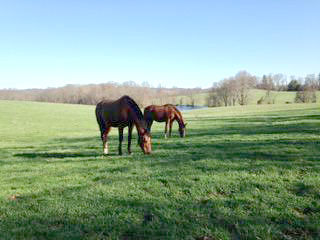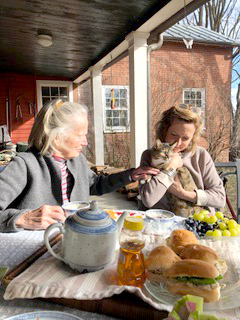A gift that will last many, many lifetimes

Sometimes the best gifts don’t arrive under a Christmas tree all wrapped in glittery paper: they’re just too big. After all, it would be quite a challenge for Santa to stuff 200 acres of prime farmland down the chimney.
Essentially, that’s what a conservation easement is—a gift to everyone who enjoys a breathtaking vista, a pristine forest, a clean stream, a historic site, and open space with nary a McMansion on it.
Meanwhile, the owner can keep the property, sell it, pass it on to heirs; what they can never do is develop it.
Who gives up the right to develop valuable property?
Typically, people think of scions of wealthy families or techies who made it very big in the ‘90s. Truth is, they are also local farm owners like Claire Abraham, who placed her 75-acre Hidden Covey farm near Lovettsville in easement with the Northern Virginia Conservation Trust, or the Chatfield-Taylors, who wanted to honor their mother by preserving her 60-acre farm with its 1850 farmhouse.

and her daughter Constance
“A few nights after our mother died,” remembers Constance, youngest of the six Chatfield-Taylor siblings, “I was looking for pictures for a slide show when I came across an album titled ‘House,’ filled with photos of every room, including all eight bedrooms. The wonderful, long, southern-facing porch with its sagging wicker furniture. Favorite fall maple trees, the barn with fences that needed fixing, drenched in sun. The front hall with the door open, the screen door probably letting in a cool summer breeze. And animals. Her old lab in front of her desk. The white cat curled up in a basket on the kitchen table. Horses grazing over the fence just off the back porch. Cattle in the field. The photos were fading and old, but they captured what she loved about her house—its warmth, her animals, her home.
“My mother had lived in Virginia for most of her long life and had a real appreciation of old houses and how they ‘fit into the countryside.’ The relation of the house to the barn, the way the light moved through the seasons, the garden—the landscape as a whole. How it works together, how it fits. ‘And this house, this farm?’ she said. ‘It’s perfect.’
“The Quaker village of Lincoln was perfect, too, and wrapped its arms around our mother. She went to Christmas parties and ice cream socials, and always was a judge in the 4th of July parade. In 2019, at the age of 100, our mother was the Grand Marshal, riding in a red convertible throwing candy and holding flowers from a neighbor’s garden, leading the parade of chickens, ponies, dogs, kids, and bicycles.

“When she was 99, we were sitting in the dining room, a fire going. We talked once again about putting the farm in easement, but she told me that all of her six children had to agree, and that was still not the case. ‘What would you like to see happen to the farm, how do you want it to look when you are not here?’ I asked. She sat quietly looking toward the old orchard on the other side of the fence. ‘I would want to be able to look out the window and see horses and cattle, pretty much as it looks now.’”
A legacy of land
“Our mother left us on February 18, a quiet winter early evening, surrounded by family, light filtering through the windows. Beyond, the pandemic was ramping up, a mere mention in the news; 100 years earlier, she was born near the end of another. Down the road, the community had gathered for a meeting at the Quaker Meeting House. The chalkboard at the edge of town had held details of the meeting. At the conclusion, an announcement was made. ‘Mrs. Chatfield-Taylor passed away earlier this evening. She will be missed.’ As people left and walked home, our mother was driven slowly, with flashers on, through Lincoln for the last time. Some neighbors raised a glass of wine while one visited the chalkboard and changed it to read, ‘Bon voyage, Mrs. C-T.’”
In the months following their mother’s death, Kassie Kingsley, the eldest sibling, spearheaded the conservation easement effort and set up a meeting with the Land Trust of Virginia to see what the process entailed. The family would need appraisals, a lawyer, and an accounting specialist, but the Trust would walk them through the process, which took about three and a half months. The easement has been approved, and possible tax credits may be coming, which could offset the expense of setting it up.
“With the preservation of her farm,” says Constance, “we believe that our mother’s vision will live on, and a green ‘link’ will be forever provided to her much-loved village of Lincoln.”
If you are considering making a gift that will last forever, the Land Trust of Virginia can offer guidance and answer questions about conservation easements. Go to landtrustva.org, or call Sally Price, executive director, or Ashton Cole, director of conservation and stewardship at (540) 687-8441.
